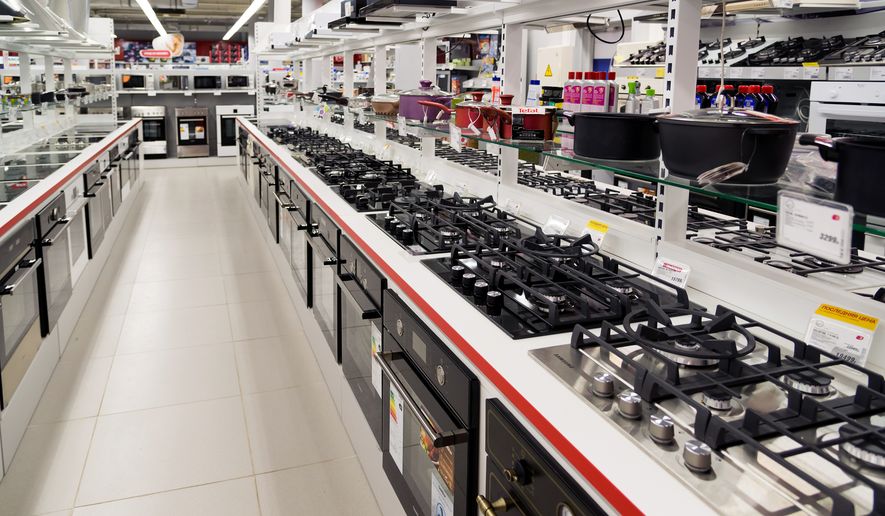Cooking with natural gas is safe and does not play a significant role in determining indoor air quality, according to an analysis of available studies and government assessments evaluating gas stove cooking.
The report, released by industry groups and an environmental consulting firm, found the type of food cooked, specifically meat and cooking oil, more significantly influences indoor air quality than whether a gas or electric stove is used.
The analysis disputes a green energy group’s recent peer-reviewed research that claimed nearly 13% of childhood asthma can scientifically be traced to the use of gas stoves, and it comes as both the Department of Energy and the Consumer Product Safety Commission are seeking ways to regulate or even limit the appliances.
The CPSC voted recently to request public input on “chronic hazards associated with gas stoves,” and the Department of Energy is examining stringent new energy efficiency standards for gas stoves that manufacturers say could double the time it takes to boil water.
The CPSC is acting at the request of Commissioner Richard Trumka who recently called gas stoves a “hidden hazard” in response to the study claiming they are to blame for nearly 13% of childhood asthma.
The conclusions were drawn from a widely reported review of study data produced in part by the green energy group Rocky Mountain Institute. But the group’s conclusions are flawed, according to a review of published data funded by the California Restaurant Association and backed by the California Building Industry Association and Catalyst Environmental Solutions.
They say the 13% figure comes from a study that combines data from kitchens in North America, Europe and Asia. When segregated, the North American data did not show a statistically significant risk of asthma associated with gas stoves, said the review’s authors, Steve Huntley and Daniel Tormey, president of Catalyst Environmental Solutions.
The data also showed that there was no statistically significant relationship from any of the data between asthma and the main particulate matter produced from the combustion of natural gas.
Instead, Mr. Tormey and Mr. Huntley found, the data from the study tying asthma to gas stoves “indicate that any effects may be due to the foods being cooked (or other confounding factors) rather than the fuel used.”
Frying or grilling meat, including chicken, pork and beef, for example, produces “ultrafine particulate” measured in the studies, which is not generated by gas stove emissions.
“While recent media reports have suggested studies are increasingly showing a link between gas cooking and respiratory illnesses, our review of those and other studies does not support that narrative,” Mr. Tormey said. “We find the body of research on cooking and indoor air quality points toward the value of proper ventilation, regardless of whether an electric or gas stove is used.”
Green energy groups have increasingly warned about health and environmental dangers associated with gas stoves.
The warnings have resonated from local governments, some of which are banning new gas stove hookups, all the way to the Biden administration and Congress.
A group of 20 senators and House lawmakers, all Democrats, recently wrote to CPSC Chair Alexander Hoehn-Saric calling on the commission to “take action [against] the risks posed to consumers from indoor air pollution generated by gas stoves.”
Roughly 40% of U.S. households cook with gas stoves.
In January, Mr. Trumka said the CPSC would consider banning gas stoves if the asthma risk claimed by some studies could not be mitigated. The Biden administration suffered fierce backlash against Mr. Trumka’s comments and then denied a ban was on the table.
Mr. Trumka is not backing down, however. He swayed the five-member commission, which has one vacancy, to vote 3-1 in favor of a request for public input about the risks associated with the stoves.
Even though such a step is often a preliminary move leading to additional regulation, a spokeswoman told The Washington Times that “no regulatory action is planned, and any such action would require a vote by the full Commission, which has not expressed support for any regulation.”
Mr. Tormey and Mr. Huntley plan to provide their research to the CPSC.
They found flaws in many of the studies claiming health risks are associated with gas stove cooking.
In some studies they analyzed, scientists were able to raise indoor air pollution caused by gas stoves only by first eliminating all ventilation. In one study, a room was sealed off with plastic sheeting.
The data in the studies showed that, in addition to what is cooked, many other factors contribute to emissions from both gas and electric stoves. Those include the use of cooking oils, cooking temperature and time, as well as proper ventilation.
Some studies did not account for other pollutants or allergens in the home, including pets and smoking, and the analysis linking gas stoves to 13% of asthma cases relied heavily on data from Russia, where, the researchers acknowledged, “ventilation and air conditioning is a rarity.”
The Tormey-Huntley analysis also cited a 2013 study of more than half a million primary and secondary school children from 47 countries which found “no evidence of an association” between gas cooking and asthma diagnosis or asthma symptoms.
In an interview with The Times, Mr. Tormey said definitive research on gas stoves has yet to be conducted.
The studies he reviewed with Mr. Huntley theorize correlations between gas stoves and health problems, but the appliances have not been sufficiently studied using a pure risk assessment. That involves measuring concentrations of particular chemicals from gas or electric stove while cooking and then using the data to determine toxicity and potential impacts on health.
“The risk assessment process calculates what the human health risk is, then you do a cumulative risk assessment where you look at the exposure to all the chemicals,” Mr. Tormey said. “Something like that gets a lot closer to definitive. And I haven’t seen one of those in the literature yet.”
• Susan Ferrechio can be reached at sferrechio@washingtontimes.com.




Please read our comment policy before commenting.